Stepping up to publishing
| sharing, writingA nifty thing about experiments is that you can often see their impact when you review, even if the changes are less visible day to day. For example, I've resolved to be my own client and spend less time consulting, more time writing–and to be more selfish about my writing (that is, to give myself even more permission to write about personal reflections while figuring things out). It's been a little over a week since then, and I noticed something interesting. I've drawn roughly the same number of sketches, but the difference is that I've been digging deeper into my questions over a series of sketches instead of scattering my sketches over a wide range of topics. That makes it easier to write a blog post that ties together different questions. To be fair, there's a large set from last week that I haven't written up, but I like this workflow so far.
I've been thinking a lot about how to move towards writing things that are useful for both me and others. Ramon Williamson and Paul Kripp nudged me to think more about packaging and publishing my notes – creating an interface for what I know. Since I have a large archive and perhaps an idiosyncratic way of describing things, searching for tips can be difficult. A good way to find things is to ask me: blog comments, e-mail, real-time conversations (free or paid). If I take the time to organize what I know–to draw those paths through the material, and to translate/update reflections into tips–people will find it easier to learn. It takes work and it seems like a distraction from going ever onward, but doing this allows me to help people learn faster, so then we can all get to the more interesting questions.
I was thinking about whom I get to talk to because of this writing and sharing. A lot of people come to this blog because they're searching for something specific: Emacs tips, for example. A surprising number of people explore more and stick around, because it turns out we have a lot of common interests or they like what I share. I know what this feels like – I love coming across blogs I resonate with too. These people are my tribe. (Well, sans tribal leader; I think of us more as peers. =) ) A few people become part of my life as confederates: I know what they're interested in and I'm comfortable reaching out to them if I'm trying to figure something out. Different kinds of sharing reach different kinds of people. I don't expect casual readers to read through one of my long reflections. I can serve them best with tightly-focused tips.
How can I make it easier for people to come closer and take advantage of what I'm learning? For searchers, I think it's important to make talking to me less intimidating. I like questions. Writing clear tips and arranging resources into maps or sequences can help, too.
For people who would like to be tribe members, making subscription easier might help. I'm switching over to using Mailchimp so that people can set up daily, weekly, monthly, or yearly subscriptions, and I've written about using feed readers. If you want to subscribe to a subset of my blog (for example, just learning tips), e-mail me and I'll help you figure that out. =) More importantly, though, I can build relationships with people by offering and asking for help.
As for confederates, I find that a lot of these conversations evolve out of the questions I post and the feedback I share after applying people's advice. I can ask more questions and get better at learning from people. I can also pay more attention and learn more about people's interests: checking out their tweets or blog posts, following them for the serendipity of overheard conversations.
One of the reasons to publish is to reach an audience that might not even know that this could be useful for them. I feel like this about a lot of books – I hadn't thought of looking for the information, but I'm glad I came across it. There are a lot of hoops to jump through before you can get to that level of reach, though. I don't think I'd ever be up for a book tour. I like being home. =) I suspect that a very wide reach might be more hassle than it's worth, but that might just be anxiety talking, and Stoicism might help me get past that.
So really, what are my excuses for not having packaged and published more? When it comes down to it, I really don't have a good excuse. Yes, it's tempting to keep pushing on to new topics, new ideas, new experiments. But if I skip the sharing part – or do it in a superficial manner, sharing my reflections without integrating it further – then I shortchange myself. As SketchyMuslims indirectly reminded me by quoting me:
The time I take to share what I learn is the most valuable part of my learning process.
The learning machine: How I turn what I learn into blog posts (me – September 2013!)
It's not enough for me to turn my reflections into blog posts. I need to work on them again and turn them into insights that I can share with people. Maybe I'll use the “reflection” tag to indicate stuff I'm mostly writing for myself (although other people can chime in, of course) and the “tips” tag to indicate stuff I'm writing mostly for other people. That turns it into something trackable. For example, this is very much a me-thinking-out-loud sort of post.
One way that I like dealing with my excuses is to convince myself of the selfish benefits of doing something. In this case: Yes, books are good for helping people learn. They are good for serendipitous learning. They're better at surviving than blogs are. More than that, books let people physically interact with ideas – to highlight, add notes, dogear, pass on to others… I'd love to eventually learn how to build these resources to help people learn, so why not sooner rather than later?
Besides, I can get a lot of benefits out of putting together books. The immediate benefit is that I can save time explaining things, since I can set people on a path that guides them for the most part. The secondary benefit is that I learn more deeply by revisiting the topics and organizing them into paths. The tertiary benefit (and the most awesome one!) is that I can help people learn faster, catch up faster, so that we all get to the point of asking more interesting questions. If I can help people learn more, I can learn more from them. And there's the totally awesome feeling that Paul Klipp shared with me: that of getting a physical copy of your ideas into your hands! (I should definitely check out CreateSpace.)
The path is straightforward, and there really aren't any barriers in my way. It's all about butt-in-chair time: devoting some time to reviewing, revising, organizing, packaging. Well, there are some things that can help.
- Questions! Questions are awesome because they help me figure out what people might find useful, what sequence might be good, and what's missing. Ask me questions. Comments, Twitter, Google+, e-mail, Helpouts… Don't worry about asking questions about things I've already covered before – in fact, please ask, so that I can make those things more findable and understandable.
- Confederates and tribe members! I learn a ton by talking to people who are actively trying to figure things out too. =)
That's how you can help. As for me, there are lots of little things I can do every day to move things forward.
The goal: More coherent, logically ordered, clearly written, other-focused chunks (maybe 15-30 pages?) that people can read at their convenience. Let's make it happen!

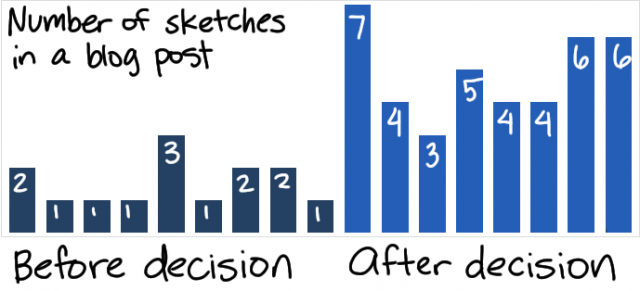
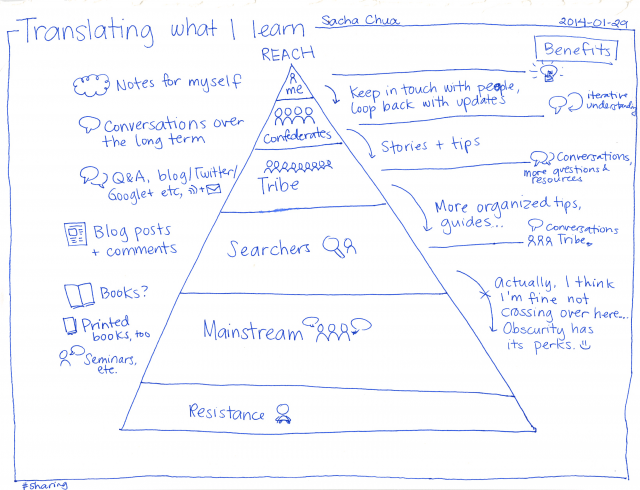
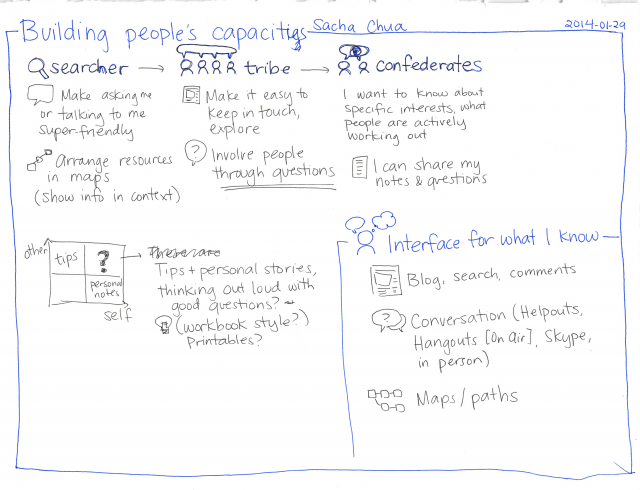
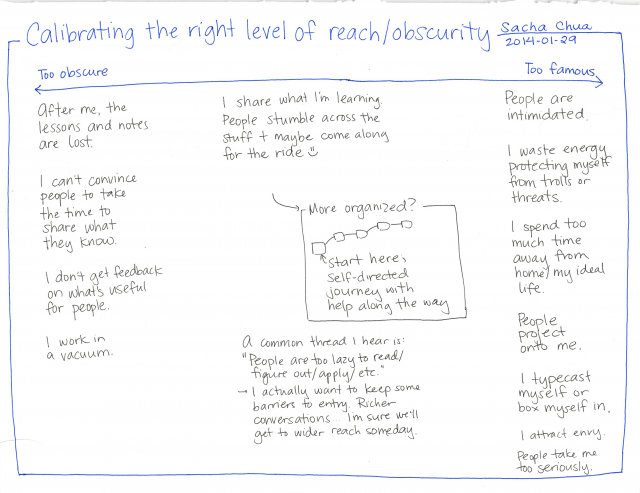
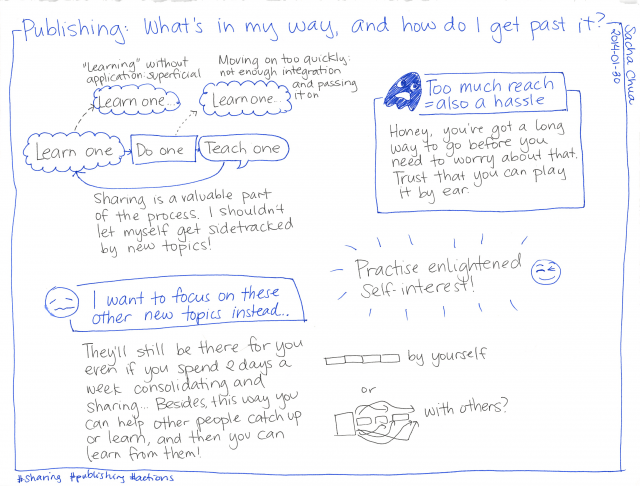

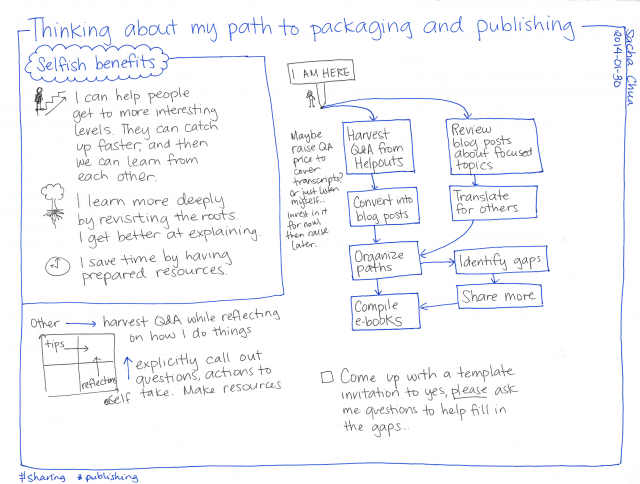
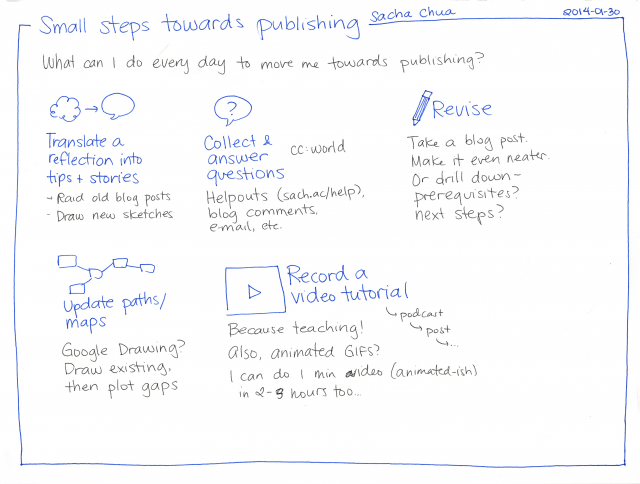
5 comments
Jay
2014-02-15T13:11:22ZJust bought the kindle version of the no excuses book (Thank You). I have read a few dozen pages of your blog - I have one question though. With your five year experiment, are you making an income? You aren't doing client work, your books are "pay what you like" - so I was just wondering how you are able to sustain. I'd like to do an experiment like this (may be for a year first), hence this question. Sorry if it is too direct.
sachac
2014-02-15T20:28:14ZI'm actually still doing a bit of consulting. I don't have to, but I like the team, and I don't want to leave them in the lurch. Besides, they're okay with my working really flexible hours, and I like the difference I help them make. =)
I've decided to "buy back" all the time I spent earning so far, and the same for the near future. I'll still probably keep consulting for the next little while, since I want to get that client past a major milestone. I tend to go back and forth on the balance (and I lean more towards working on my own things), but I think that the diversion of some attention towards consulting might be a good test for developing systems to help me make and share stuff even without 100% focused attention.
That said, even if I didn't do any client work or have any income, I saved more than enough to sustain at least the experiment for the five years I planned. I continued living like a student even when I was earning as a professional, and I'm frugal by nature. I was pleasantly surprised to discover that my safety net might actually be sustainable for much longer. Last year was a good one for the stock market - my portfolio's capital gains were twice my expenses. The past few years have been surprisingly good as well. Of course, I haven't actually sold any stocks (just gradually working through the GICs that I set aside specifically for my experiment), so the assets that are in index funds may very well lose most of their value if the market crashes. I figure that when the market crashes again (as it probably will, someday), I'll probably still be all right. I can go back to work if needed. In the meantime, it's great to be able to experiment.
Basically, I planned for not having income. I have unexpected income (investments, consulting, and even little things like people's appreciation for books). I have no plans of increasing my standard of living. So I stash part of the income for increasing my margin of safety and use part of it to learn how to scale up. =) Since I'm in the rare position where I can follow my own questions, make things, and give them away, I figure I should.
Does that help explain things?
Thanks for buying the book, by the way! =) I'd love to hear which excuse resonated with you and what can help you move forward.
Jay
2014-02-15T21:50:12ZWow, this is an awesome answer - thank you for being candid. Yes it does explain things. Is it okay to ask, what kind of consulting? programming, or sketch noting?
I don't have much saved, so I guess it's going to be a while before I can experiment with retirement (also have parents that depend on me).
It is awesome to read your success (I've started following a few other blogs too, like ERE). Thanks again, for responding to my question (I was in two minds whether to post or not, as it seemed too direct).
I haven't started reading the book yet (will hopefully do it tomorrow). I used to blog before. Without reading the book, I'd say my 2 excuses are 1. laziness and 2.trying to write really good articles, instead of just writing (more than once, I decided not to publish the posts, after spending hours writing them, since I thought they weren't "good enough"). I'm not sure if these reasons are included in the book - there might be other reasons too, I guess I'll find out when I read it :) Will report back here.
Please keep the awesome articles coming :)
sachac
2014-02-16T01:00:02ZSocial business consulting combined with web development - I'm lucky that the thing that intrigued me during my master's turned out to be something enterprises found really interesting too. =)
I write because I'm too lazy to learn things or explain things to other people again and again. ;) Also, funnily enough, you can't write really good stuff without writing lots and lots of (usually very bad) stuff. In fact, I've given up on writing good stuff altogether. I write, and I'm always pleasantly surprised when people actually find something useful in what I share. (Which is why questions are good, because then at least one other person is curious about something... <laugh>)
Don't worry. Just get stuff out there and learn. =)
(And if you want to pick my brain, check out http://sach.ac/meet and pick a time that's good for you - happy to help you along the way!)
Jay
2014-02-16T03:43:17ZI'm not sure what social business consulting is, but I am familiar with web dev (I'm a software developer).
Hmmm - that makes sense. I guess I should just do it, without worrying too much about the result :)
Thank you for your offer to help. I'll take it up - just need to make sure I have my questions ready, so I don't waste your time :)
Thanks again, for patiently answering my questions!!